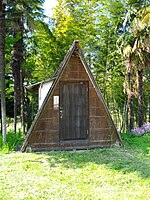| 武者小路 実篤 (むしゃのこうじ さねあつ) | |
|---|---|
 1956年 | |
| 誕生 | 1885年5月12日 (現・東京都千代田区) |
| 死没 | 1976年4月9日(90歳没) |
| 墓地 | 中央霊園(東京都八王子市) |
| 職業 | 小説家・詩人・劇作家・画家 |
| 言語 | 日本語 |
| 国籍 | |
| 最終学歴 | 学習院高等科卒業 |
| ジャンル | 小説・詩・戯曲 |
| 主題 | 理想主義 |
| 文学活動 | 白樺派 |
| 代表作 | 『お目出たき人』(1911年) 『その妹』(1915年,戯曲) 『幸福者』(1919年) 『友情』(1919年) 『人間万歳』(1922年,戯曲) 『愛慾』(1926年,戯曲) 『愛と死』(1939年) 『真理先生』(1951年) |
| 主な受賞歴 | 文化勲章(1951年) |
| 親族 | 勘解由小路資生(祖父) 武者小路実世(父) 武者小路公共(兄) 武者小路実光(甥) 武者小路公秀(甥) 武者小路穣(娘婿) |
武者小路 実篤(むしゃのこうじ さねあつ、1885年(明治18年)5月12日 - 1976年(昭和51年)4月9日)は、日本の小説家・詩人・劇作家・画家。貴族院勅選議員。華族の出で、トルストイに傾倒し、『白樺』創刊に参加。天衣無縫の文体で人道主義文学を創造し、「新しき村」を建設して実践運動を行った。伝記や美術論も数多い。
姓の武者小路は本来「むしゃのこうじ」と読むが、後に「むしゃこうじ」に読み方を変更した[1]。しかし、一般には「むしゃのこうじ」で普及しており、本人も誤りだと糺すことはなかったという。
- 『友情』(1919–1920年)
- 『愛と死』(1939年)
Atarashiki-mura (新しき村), "New Village", is a Japanese intentional community founded by the author, artist and philosopher Saneatsu Mushanokōji.
It was founded in 1918 in Hyūga, in the mountains of Miyazaki Prefecture in Kyūshū, but in 1939 they were warned that much of their land was about to be submerged by the construction of a dam, so they searched for a new home and found 10 hectares in Moroyama, Iruma District, Saitama Prefecture. A few members remain at Hyūga to this day, but they are still to a certain extent dependent on the Saitama community and support from "external members".
Mushanokōji worked at the village for a while, but later found that he could help it more by working outside and supporting it with the income from his novels, plays and paintings. There has always been a strong artistic bent at the Mura (as distinct from other religious or political communes, or the well-known Israeli kibbutzim) and many well-known artists lived there or supported it externally. Although there is an art gallery which also produces some publications, and various members have at times worked as potters, for much of its existence, most of the community's income has come from agriculture, including battery-hen eggs (and fertilizer produced from their manure), shiitake, rice, organic vegetables, and to a lesser extent green tea, apricots, and bread. There used to be a nursery school.
The income earned by activities in the village is pooled, and individual members receive only 'pocket money', but all other needs are met, including housing, food, medical care, and schooling. Members live in their own houses, in 'conventional' family units with private possessions, but most food is eaten in a communal dining area which also has a stage used for occasional plays and concerts. There are monthly meetings to decide any matters affecting the village, and in principle all decisions must be unanimous.
Premature rumours of Atarashiki-mura's demise have existed for decades, but it is a fact that the population is ageing and there is a shortage of new entrants, while children born in the village tend to migrate outside, so its future is far from secure. Membership in 2007 was 21 people in 16 households, with approximately 200 external supporters; there were five members in three households at the Hyūga site. By 2016 membership had declined further to 11 residents, many of whom were in their seventies. The surviving members are no longer young/fit enough to continue the egg business, and partly to offset the punitive effects of new tax regulations, large parts of the village land have been covered in solar panels, although the income from this is only guaranteed until around 2020, when the community is likely to face a financial crisis.
Ideals[edit]
The "spirit of Atarashiki-mura" is summed up in six lines written by Mushanokōji and reprinted on the back of each issue of the village's magazine.
- Our ideal is that all the world's people should fulfil their own destinies, and that the individuality residing in each one of them should be allowed to grow fully.
- One must not therefore allow the promotion of one's own individuality to infringe upon the individuality of others.
- Hence one must promote one's own individuality in a correct manner. One must not harm the destiny or just demands of other people merely for the sake of one's own pleasure, happiness or freedom.
- We will work so that all the world's people may share our ideals and choose the same style of life, and thereby walk along a path where they are able to fulfil their duties equally, enjoy freedom, lead correct lives and fulfil their destinies (including individuality).
- Those who endeavour to live this way, who believe in the possibility of such a way of life and pray or hope fervently that all the world's people may put it into practice, such people are members of Atarashiki-mura and are our brothers and sisters.
- We therefore believe that if all people embark upon a correct way of life, or endeavour to do so, and such people truly cooperate with each other, then the world we desire will come to be without struggle between nations nor between classes. We will do our utmost to achieve this goal.
Flag[edit]
The village has a flag, consisting of four colours (representing the four races) surrounded by blue (representing the world in which they should co-exist peacefully).
岩波茂雄
34我給你們一條新命令:你們該彼此相愛;如同我愛了你們,你們也該照樣彼此相愛。
35如果你們之間彼此相親相愛,世人因此就可認出你們是我的門徒。」
John 13:34-35
John 13:34-35King James Version
34 A new commandment I give unto you, That ye love one another; as I have loved you, that ye also love one another.
35 By this shall all men know that ye are my disciples, if ye have love one to another.
John 13:34-35New International Version
34 “A new command I give you: Love one another. As I have loved you, so you must love one another. 35 By this everyone will know that you are my disciples, if you love one another.”





沒有留言:
張貼留言